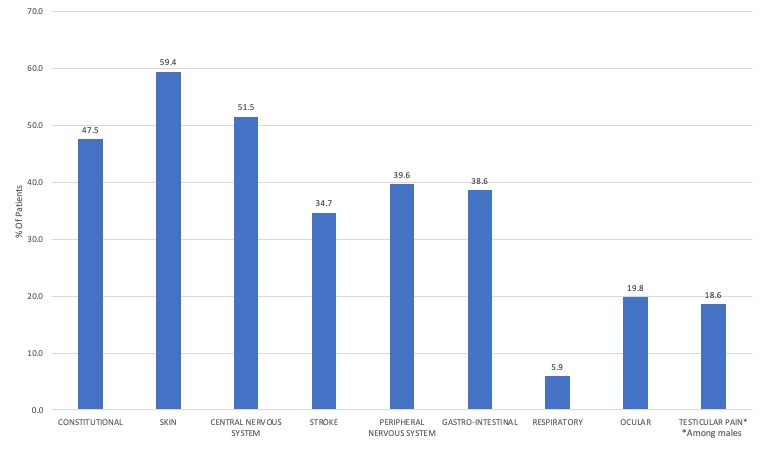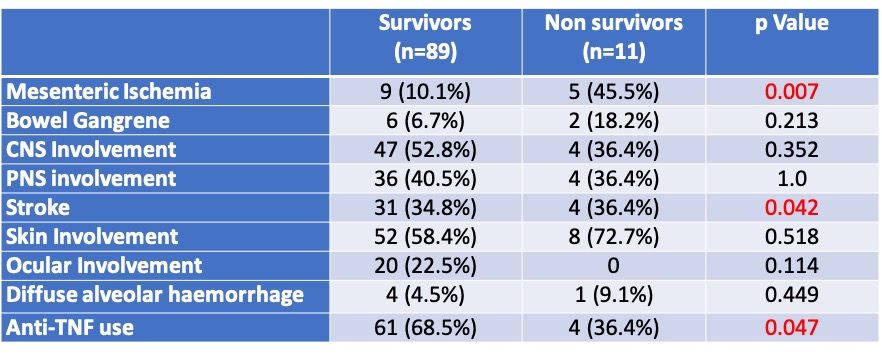Session Information
Date: Monday, November 18, 2024
Title: Abstracts: Vasculitis – Non-ANCA-Associated & Related Disorders II
Session Type: Abstract Session
Session Time: 3:00PM-4:30PM
Background/Purpose: Deficiency of adenosine deaminase 2 (DADA2) is a rare and potentially life threatening monogenic disorder characterized by systemic vasculitis, bone marrow failure, and immunodeficiency. Understanding its clinical manifestations in different cohorts, and predictors of mortality are crucial for making treatment decisions and directing future research.
Methods: A retrospective analysis was conducted on paediatric and adult patients diagnosed with DADA2 across multiple rheumatology centres in India. DADA2 cases were diagnosed between April 2017 and May 2024, on the basis of ADA2 genetic testing and/or ADA2 enzyme activity assay. Clinical characteristics, treatment outcomes and factors associated with mortality were evaluated.
Results: 101 patients with a confirmed diagnosis of DADA2 were included. The median age of disease onset was 17 years (6 months – 59 years). 49 (48.5%) had childhood onset of the disease (<16 years). The most common clinical manifestations included cutaneous (60%) and CNS symptoms (52%). Gastrointestinal(GI) manifestations were present in 39% of patients among which mesenteric ischemia was present in 13.8%. Strokes were noted in 35% patients. Among the stroke patients 31 patients had ischemic CVA while 13 had hemorrhagic CVA. The rare manifestations in this cohort included amyloidosis, optic neuritis, pancreatic infarction, focal myocarditis and posterior reversible encephalopathy syndrome. Various manifestations are shown in Figure 1.
Twelve deaths (11.8%) were recorded, out of which eleven were due to the underlying active disease, and one was due to suicide, which was excluded from final survival analysis. The median age of onset of disease for the expired patients was 17 years. 5 of the 11 patients who expired had childhood onset of the disease. There was no significant association between the age of onset of disease and mortality (p=0.142) .Cause of death was GI involvement in 8 and stroke in 3 (2 haemorrhagic, 1 ischemic) patients. 65 of the 101 patients were on anti-TNF therapy. 7 (5 with GI involvement and 2 with stroke) of the 11 patients who expired were not receiving anti-TNF therapy at the time of death. Mortality was associated with mesenteric ischemia (p= 0.007), stroke(p=0.042) and those not receiving anti-TNF therapy (p=0.041).(Table 1).
Conclusion: Mesenteric ischemia, stroke and non-usage of anti-TNF therapy were significant predictors of mortality. Impact of disease on mental health may have contributed to suicide thus needs to be addressed in management.
To cite this abstract in AMA style:
Sharma A, Bhowmick N, naidu s, Dhir V, Bhatia P, Sharma V, Bhattad s, Kavadichanda C, Gupta V, Misra D, Malviya S, RAJKIRAN D, Sharma B, Mathew J, Kumar S, Bhojwani R, Dhooria A, Jain A, Gupta P, Agarwal V, Chatterjee R, Sharma K, Singhal M, Singh H, Parmar A, Shenoy P, Nada R, Minz R, Khan A, Sutnga S, Singh M, Bhojani K, MAMADAPUR M, Manoj M, Srivastava P, MB A, Krishna K, Jois R, Negi V, Aggarwal A, jain s, Khubchandani R, Chambers C, Lee P. Clinical Characteristics , Treatment Outcomes and Predictors of Mortality in a DADA2 Cohort of 101 Patients [abstract]. Arthritis Rheumatol. 2024; 76 (suppl 9). https://acrabstracts.org/abstract/clinical-characteristics-treatment-outcomes-and-predictors-of-mortality-in-a-dada2-cohort-of-101-patients/. Accessed .« Back to ACR Convergence 2024
ACR Meeting Abstracts - https://acrabstracts.org/abstract/clinical-characteristics-treatment-outcomes-and-predictors-of-mortality-in-a-dada2-cohort-of-101-patients/


